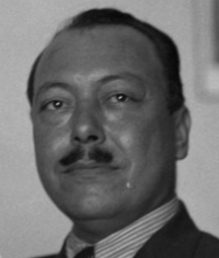Loading AI tools
Palestinian Jordanian politician (1895–1962) From Wikipedia, the free encyclopedia
Husayn Fakhri al-Khalidi (Arabic: حسين فخري الخالدي, Ḥusayn Fakhri al-Khalidī, 1895 – 6 February 1962) was mayor of Jerusalem from 1935 to 1937 and the 13th Prime Minister of Jordan in 1957.
Husayn al-Khalidi | |
|---|---|
 | |
| Mayor of Jerusalem | |
| In office January 1935 – 1937 | |
| Preceded by | Raghib al-Nashashibi |
| Succeeded by | Daniel Auster |
| 13th Prime Minister of Jordan | |
| In office 15 April 1957 – 24 April 1957 | |
| Monarch | King Hussein |
| Preceded by | Suleiman al-Nabulsi |
| Succeeded by | Ibrahim Hashem |
| Personal details | |
| Born | 17 January 1895 Jerusalem, Ottoman Empire |
| Died | 6 February 1962 (age 67) |
| Political party | Reform Party |
| Relations | Ismail al-Khalidi (brother) |
Khalidi served as a doctor in the Ottoman Army during World War I, and was injured three times. He subsequently served for over a decade as a member of Jerusalem's Health Department and as an Inspector of Jerusalem's Water Department.[1]
In September of 1934, Kalidi sought election as both as Mayor of Jerusalem and for Raghib al-Nashashibi's seat on the City Council. He won the latter,[2] and was subsequently appointed to the former on 21 January 1935, days after an appeal of the election results by Nasashibi was rejected by the Jerusalem District Court. Daniel Auster and Yacoub Farradj became Deputy Mayors.[3][4]
On 23 June 1935 Khalidi founded the Reform Party and was subsequently the party's representative to the Arab Higher Committee.[5]

On 1 October 1937, amid the 1936–39 Arab revolt in Palestine, the British Mandate administration outlawed the AHC and several Arab political parties and arrested a number of Arab political leaders. The Reform Party was dissolved and Khalidi was one of the leaders arrested.[6][7] He was removed as mayor of Jerusalem and deported to the Seychelles, together with four other Arab nationalist political leaders.[6] He was released in December 1938[7] to enable him to take part in the London Conference in February 1939, and was among those rejecting the British Government's White Paper of 1939.[8]
Khalidi returned to Mandatory Palestine in November 1942[9] and joined the reformed Arab Higher Committee in 1945, becoming its secretary in 1946. He was a member of the short-lived All-Palestine Government established under Egypt's patronage in Gaza in September 1948. He published a book of his memoirs in the same year, while exiled in Beirut.[10] He prospered under Jordanian rule, he was custodian and supervisor of the Haram al-Sharif in 1951, became a cabinet minister (for Foreign Affairs) and briefly prime minister in 1957.[11] In 1958, he wrote a book in English entitled Arab Exodus, though it has never been published.[10]
Khalidi died on 6 February 1962.[12] He was the brother of Ismail Khalidi and the uncle of Rashid Khalidi and Raja Khalidi.[13]
Seamless Wikipedia browsing. On steroids.
Every time you click a link to Wikipedia, Wiktionary or Wikiquote in your browser's search results, it will show the modern Wikiwand interface.
Wikiwand extension is a five stars, simple, with minimum permission required to keep your browsing private, safe and transparent.